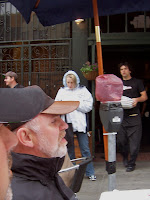"...the most powerful and profound awareness of ourselves occurs with our simultaneous opening up with another human...." Malone & Malone
Unfinished business has been a popular topic here and with good reason; it is
so critical that we try for transparency, especially with ourselves. (If you have not been following this series, please see the two posts, Unfinished Business and Feelings, for background to this post). There are, of course, small glitches in our awareness of ourselves but, on the other hand, sometimes an unconscious conflict can affect the entire course of an adult life.
The so-called fear of intimacy is one that can ruin all or most of your relationships and prevent you from enjoying true closeness with another human being. This was one of those topics that got a lot of press in the field of psychology for awhile; when that happens, an idea can begin to sound trite. But, in this case, that criticism is unfounded.
The fear of intimacy exists and interferes with marriages, friendships, and parent-child relationships.
So, what does intimacy between two people look like? It requires trust, of oneself and of the other. It includes immediacy, meaning that you interact with that person in the present and without guile.
Risk, emotional risk and vulnerability are a part of the experience because you cannot control the course of the interaction nor the outcome. It will sometimes be emotionally painful. But, the joy that is possible is unparalleled.
What it is not is,---guarded, defended, withdrawn, retreated, skeptical, dishonest.

It can be fun, exciting, and bonding. It erases loneliness.
And yet, this is one of the most often avoided human experiences.
How do you even know if you are preventing yourself from enjoying emotional intimacy? Some of the signals might be, for example, people complain about how difficult it is to make a meeting date with you. Maybe others say you don't allow affection unless you initiate it. You can't see anyone else until you have yourself perfectly groomed and ready or, another version of that, no guests without your house being immaculate. You can't do much on the spur of the moment-you must know what you are doing way in advance. You accept invitations and then just don't show up. Maybe you are in a loving, intimate relationship and you cause a fight whenever things get good. When having the most fun with your partner you can suddenly , inexplicably, shut down, not even aware you are doing it; you have a partner who looks puzzled and hurt. You notice that you feel trapped when a friend or lover tries to talk frankly with you about your relationship with them. There are a million ways this can be manifested. Look for it, in yourself and others. You will begin to find lots of examples, I'm sure.
So, why? Why does a person deprive themselves (and their loved ones) of this deep human need? Because it is a little scary to be in an emotionally intimate relationship. You might find yourself worrying: What will happen if I lose this person? I'll be devastated. Or you find your own activities being interrupted by thoughts of that person, maybe missing them. To stay in this exquisite position of feeling loved and loving, one must tolerate a bit of shakiness here and there. It is an adventure, the future becomes a mystery and you just have to buy in for the ride---not so easy to do. But people who have the courage find great happiness.

Where does the unconscious sabotage of this delightful level of reciprocity come from?
It comes from unfinished business. When we get hurt, we usually say to ourselves: Well! I won't ever let
that happen again. And, then, in the hopes of constructing a magical suit of armor against the vicissitudes of life, we shut down a part of ourselves. That part is no longer available for experiencing or sharing.
Some individuals have had unfortunate childhoods such as being the member of an alcoholic family: In that situation, the children experience a lot of unpredictability and sometimes grow up to be adults who want to have everything under control. It's understandable---all of the various reasons are.
They make sense when they are set up. The problem is, they don't make sense for the rest of life.

So, here you can see why it is so vital that you (we, each of us) take responsibility for ourselves. For now and the future, keep up with yourself: As I said before, don't stuff it when something disturbing happens. Don't let wounds fester. Clear things up as you go, even if it is just within your own thinking process.
And if you suspect that the past is interfering with you being your optimal, essential, real self in the present---which I hope you can see from these visits to this topic, is quite common---take yourself to a therapist or begin journaling in earnest, or join a self-help group, or start one! Read things like this blog and do your own introspection; if you don't have access to a therapist, you can still figure out a lot on your own. It starts with being honest with yourself.
For an in-depth read on this topic,
"The Art of Intimacy" by Thomas Patrick Malone, M.D. & Patrick Thomas Malone, M.D.